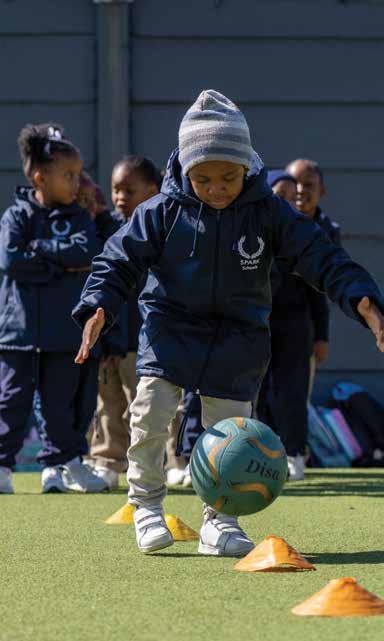
4 minute read
SPARK SCHOOLS: Brick-and-mortar schools still matter
Where tech and teachers team up for excellence.
Amidst the rapid advancement of technology in education, the traditional approach to learning remains an indispensable cornerstone. Stacey Brewer, the co-founder of SPARK Schools, acknowledges the vital role of technology in education but firmly believes that it won’t supplant teachers or physical schools. Instead, she sees technology as a catalyst for data-driven instruction, ensuring students receive tailored interventions to close gaps and excel based on global standards.
“We are about understanding each child’s needs and meeting them where they are, using technology to enhance their learning journey. Technology is one piece of the puzzle, not the whole solution,” Brewer points out.
While online schooling gained traction during the pandemic, Brewer underscores the value of brick-and-mortar institutions. According to her, schools are not merely academic centres but also nurturing grounds for character development, social interaction, and emotional learning. “In-person interaction is pivotal for holistic growth,” she adds.
“Technology will not replace teachers or brick and mortar schools, it will enhance education,” asserts Brewer, her passion palpable. SPARK, a network of private schools in SA, came into being in 2012, sparked by Brewer and her co-founder Ryan Harrison’s deep concern for local education. Their solution was a significant one: a new model that democratises quality education across the country. This is significant given the dire state of education in many parts of the country - a crisis masked by budget allocations, Brewer points out. She highlights that while education gets a large share of the country’s budget, the outcomes largely fall short of expectations. Therefore, SPARK
is on a mission to shake up education, boost access across the country, amp up results, and bridge the skills gap that is slowing down economic growth.
The journey began with SPARK Ferndale in Johannesburg, shining brightly as a symbol of hope. Since then, the network has burgeoned to encompass 20 primary schools and 4 high schools, empowering 15 000 scholars across Gauteng and the Western Cape. But they are not stopping – new schools are set to sprout each year as SPARK pushes for nationwide transformation.
Schools are not merely academic centres but also nurturing grounds for character development, social interaction, and emotional learning.
Expansion, however, isn’t without its challenges. The struggle lies in affordability, particularly in the Western Cape. “Land and property costs can be steep,” admits Brewer. But SPARK’s focus remains resolute - new schools in new areas to touch more lives. For Brewer and her team, education is a birthright. They welcome all, irrespective of academic prowess. “Any child from any community can achieve,” she firmly states.
“We are open to all,” Brewer emphasises, highlighting the school’s non-denominational stance.
Sparking greatness
SPARK uses technology to personalise learning for each child, regardless of their background. By tracking each scholar’s progress and pace of learning, teachers can understand their
needs and structure learning accordingly. From Grade R, scholars are introduced to technology to help them become tech-natives. Tools like Reading Eggs and ST Maths are utilised to make literacy and maths fun for kids. Brewer says the institution believes that every child deserves the opportunity to reach their full potential and is passionate about sparking greatness in each one of its scholars.
SPARK is more than a name - it’s a belief. The acronym signifies the values that define the institution: Service, Persistence, Achievement, Responsibility, and Kindness, Brewer stresses. SPARK isn’t just about education; it’s about systemic transformation and national upliftment, she points out.
Affordability is at the core of SPARK’s mission. At about R31 000 a year for primary education and R40 000 for
high school, the fees are a fraction of elite private institutions making quality education accessible, Brewer states. She envisions more schools sprouting, particularly in suburbs and underserved areas, eliminating long commutes and transforming lives.
Covid-19 loomed large, casting a dark cloud over education, pushing it in reverse. Brewer acknowledges the gap and advocates collective action for its closure. The trajectory remains clear –more schools, more impact. The Western Cape beckons, fuelled by the everincreasing demand.
SPARK also invests heavily in its teachers to ensure academic excellence.
“Teachers are our true assets,” Brewer asserts. The institutions educators get 245 hours of training and coaching every year. While technology dazzles, it’s the teachers
who orchestrate success, Brewer says. Teachers mould minds and shape futures. Brewer is adamant about elevating their stature, equipping them for excellence. After all, education’s quality hinges on their skill and professionalism. Brewer’s call for elevated learning expectations cuts to the core. It’s about working together to create a more innovative, effective, and equitable education system so that all children can succeed.










